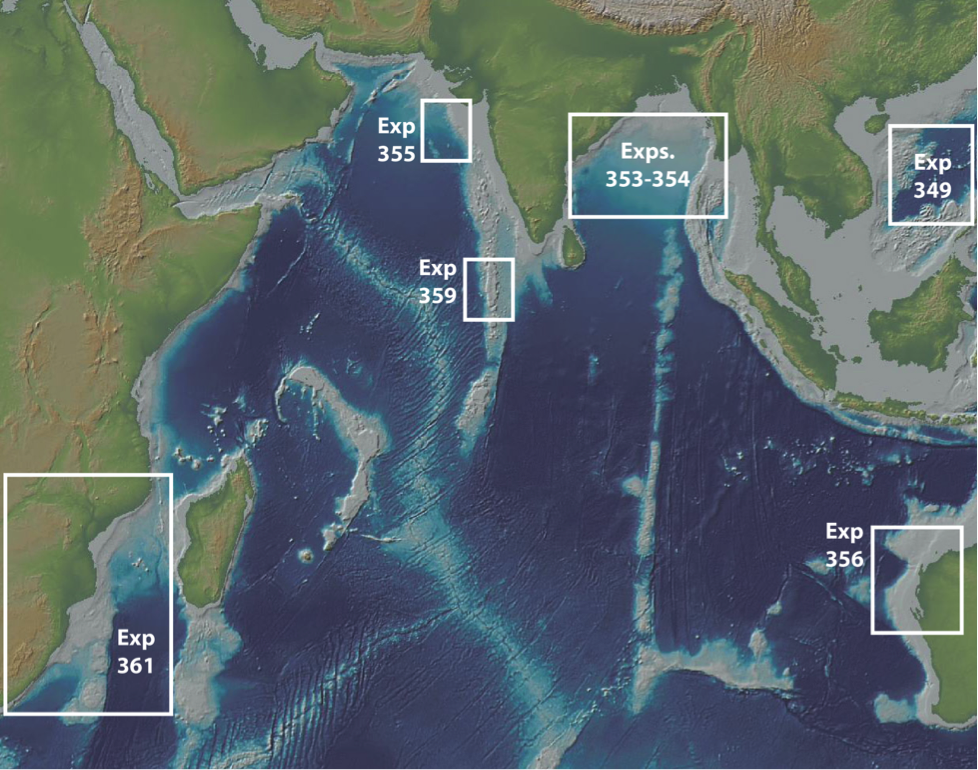Land-Ocean Interactions Across the Indian Ocean: Toward Regional Integration of Recent Drilling Results
Time: July 10-12, 2017
Location: Narragansett, Rhode Island, USA
U.S./Local Workshop Committee: Peter D. Clift (Louisiana State University), Rebecca Robinson (University of Rhode Island), Liviu Giosan (Woods Hole Oceanographic Institution)
International Workshop Organizers: Christian Betzler (University of Hamburg, Germany), Tomohisa Irino (Sapporo University, Japan)
Workshop Final Report (PDF)
The goal of this workshop is to review results of the recent regionally-focused scientific drilling expeditions in the Indian Ocean, to propose possible paths for an integrated understanding of the role and response of climate in regulating Indian Ocean hydrology, hydrography, sedimentation, and biogeochemistry, and to synthesize practical lessons for future scheduled and proposed regional IODP drilling campaigns.
Interactions between the land and ocean can provide important feedbacks to climatic evolution and surface processes. The Asian monsoon is an impressive example of these interactions as a major component of Earth’s climate affecting over half of the world population. In the Indian Ocean sector, close interactions between physical and biogeochemical processes with the tectonics of the India-Eurasia collision zone may have controlled both regional and global climate during the Cenozoic. The record of such interactions is best preserved in the ocean and was the target of recent scientific drilling across the region. Land-ocean interactions also play a critical role in modulating climate over Africa where complex interactions between the Indian monsoon and Atlantic occurs.
Between 2013 and 2016 IODP expeditions drilled in the Indian Ocean and Western Pacific oceans covering the Asian and Australian monsoon domains and adjacent regions. Reconstruction of the paleomonsoon was a leading objective for the following expeditions: IODP 346 (Sea of Japan and East China Sea), 353 (Bay of Bengal and Andaman Sea), 354 (Bengal Fan), 355 (Indus Fan), 356 (northwestern Australian continental margin), and 359 (Maldives). Expedition 361 offshore East Africa was designed to reconstruct evolving southern African environmental conditions during the Neogene and in particular to look at the history of the Agulhas Current system since around 5 Ma. The global reach of this current system may in turn play into the modulation of the monsoons.
If we are to make significant progress in understanding the climate and oceanography of the Indian Ocean region then a synthesis of results following exchange of information and debate is crucial.
Questions?
Contact Peter Clift (pclift@lsu.edu) with any questions and to apply for the workshop.
This workshop draws together researchers across these expeditions, to discuss key results and the central issues that have inspired this campaign of drilling. We aim for a broader regional perspective that will build connections between groups of researchers that might otherwise not come together. The workshop will provide the community an opportunity to synthesize results from different parts of the Indian Ocean and to build a more powerful, all-encompassing climatic model for the Cenozoic.
The campaign of drilling across the Indian Ocean also provides an important series of lessons for future sets of expeditions, such as those now planned for the Atlantic in 2019 and beyond. Many of the Indian Ocean expeditions considered different aspects of the Asian monsoon and together provide the chance to make some significant advance within a large topic in the Earth sciences. The ability to draw together and synthesize lessons learned from different expeditions is central to meeting the goals of the program as laid out in the IODP Science Plan. This same need to make substantive progress on large questions, beyond what is possible with regular funding or single drilling expeditions, while addressing the community goals will be significant for future campaigns of scientific drilling.
Exchange of scientific and logistical ideas in this workshop will provide useful lessons when developing programs involving multiple expeditions in the future. We particularly aim to examine how the stated goals of the Indian Ocean drilling campaign prior to operations, compare with the actual results. We want to understand whether a series of linked expeditions like this was more successful as a result of their association. Do they really represent a coherent campaign? Where did the program exceed expectations? Where did we fail to make the advances we were aiming for and why? How can we maximize the long term scientific impact by facilitating the exchange of ideas and data?
Questions?
Contact Peter Clift (pclift@lsu.edu) with any questions and to apply for the workshop.
Each day, participants will be transported by van between the hotel and campus. The meeting will be located on the north side of campus in the Coastal Institute Building, with meals served in the Mosby center overlooking the water.
Questions?
Contact Peter Clift (pclift@lsu.edu) with any questions and to apply for the workshop.







